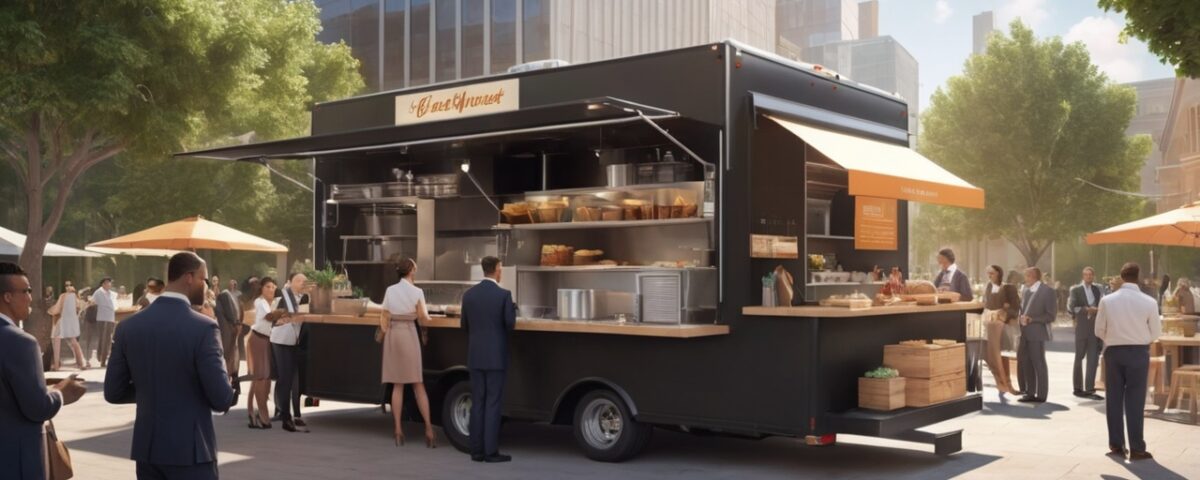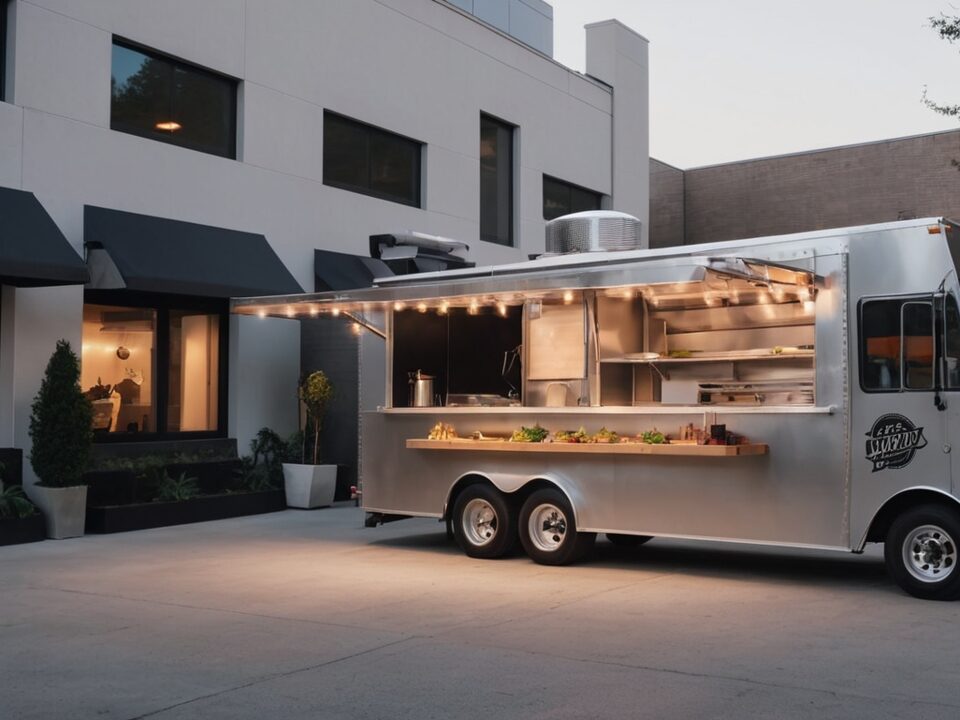
Why Food Truck Weddings Are Toronto’s Hottest Trend 2025
October 23, 2025
From Street Food to Fine Dining: The Evolution of Food Truck Culture2025
October 25, 2025What to Know Before Renting a Food Truck for Corporate Events
Planning a corporate event involves balancing professionalism, engagement, and culinary satisfaction. One trend that has gained traction is incorporating food trucks into corporate functions. Mobile catering offers flexibility, unique dining experiences, and memorable branding opportunities. However, Food Truck Rental requires careful planning to ensure the event runs smoothly. This guide offers a comprehensive look at what corporate planners should consider before booking a food truck, from menu options to logistics and guest experience.
Understanding the Benefits of Food Trucks for Corporate Events
Food Truck Rental bring energy and novelty to any corporate setting. Unlike traditional catering, trucks can offer interactive experiences where employees and clients watch meals being prepared in real time. This not only fosters engagement but also creates conversation starters that make events memorable. Moreover, the mobility of trucks allows companies to host events in unconventional locations, like rooftops, parks, or urban plazas, expanding the possibilities beyond conference rooms.
Another advantage is the customization of menus. Corporate planners can tailor offerings to specific dietary needs, brand themes, or event concepts. From international fusion dishes to gourmet comfort food, the Food Truck Rental model allows for creative culinary experiences that reflect the company’s personality and values.
Step 1: Selecting the Right Food Truck
Choosing the right vendor is paramount. Corporate events often require professionalism, reliability, and scalability. Look for trucks that have prior experience with corporate clients, valid licenses, insurance, and a strong reputation. Evaluate their menu offerings and ensure they can accommodate dietary restrictions such as vegetarian, vegan, gluten-free, and nut-free options.
Ask vendors about their ability to serve a large number of guests within a limited timeframe. Some trucks are optimized for smaller gatherings, while others can efficiently handle hundreds of attendees. Understanding these capabilities prevents bottlenecks and ensures guests receive high-quality service throughout the event.
Step 2: Menu Planning and Dietary Considerations
Menu selection goes beyond taste; it reflects your brand and event atmosphere. Start by considering the type of event: casual team-building lunches may favor interactive food stations, while formal networking receptions might require elegantly presented small plates. Work closely with the vendor to design a menu that complements the event’s goals and accommodates diverse dietary needs.
Portion control and serving speed are critical for corporate settings. Discuss how many servings the truck can produce per hour and whether the setup supports multiple lines to prevent congestion. Including clear signage or digital menu displays can streamline the service and enhance the guest experience.
Additionally, consider themed menus or seasonal specials to make the event more engaging. For example, a summer networking event might feature light, refreshing options like gourmet salads, sliders, and craft beverages, while a winter launch could emphasize warm comfort foods and hot drinks that create a cozy, memorable atmosphere.
Step 3: Logistics and Venue Considerations
Corporate event locations often present unique challenges. Conduct a site inspection to determine access routes, parking, electrical needs, water availability, and waste disposal. Ensure the venue permits food trucks and check local regulations for permits, fire codes, and health requirements. Planning these details ahead of time reduces last-minute stress and keeps the event compliant with local laws.
Space planning is also crucial. Designate areas for truck placement, guest circulation, seating, and additional services like drink stations. Consider weather contingencies for outdoor events and provide tents, shade, or heating as necessary. A well-organized layout enhances flow and prevents service interruptions.
Another logistical consideration is timing. Coordinate truck arrival, setup, and service windows with the event schedule. Include buffer times for setup and any pre-service preparations. This ensures the food is fresh and the truck operates efficiently without disrupting other event activities.
Step 4: Enhancing the Guest Experience
Food trucks offer an interactive dimension to corporate events. Staff should encourage engagement, explain menu items, and maintain high service standards. Consider adding branded elements, like customized menus or company-themed decor, to align with your corporate identity. Interactive stations, live cooking demonstrations, or sample tastings can make meals more than just sustenance—they become an experience.
Providing seating, communal tables, and designated eating areas fosters networking and collaboration. Incorporate beverage stations or dessert trucks to create variety and encourage social interaction. Attention to these details ensures that guests leave with a positive and memorable impression of both the food and the company hosting the event.
Consider interactive games or contests that pair with the food, such as a build-your-own dish station where teams compete to create the most innovative plate. This adds an experiential layer, making the meal both fun and memorable while encouraging teamwork and participation.
Step 5: Real-World Example – Tech Company Launch Event
A Toronto-based tech firm recently hosted a product launch using two gourmet food trucks. One truck served customizable sliders and fries, while the other offered artisanal desserts and coffee. Attendees enjoyed interactive meal preparation and personalized orders, enhancing networking opportunities. The trucks were strategically positioned to encourage movement and engagement, creating a lively and memorable launch event.
Step 6: Real-World Example – Corporate Team-Building Picnic
During a summer team-building event, a marketing agency rented a fusion cuisine food truck to serve employees in a park. The truck offered build-your-own taco stations, accommodating various dietary preferences. The interactive setup promoted collaboration and conversation among team members while providing high-quality, freshly prepared meals in a relaxed, outdoor setting.
Step 7: Contracts, Pricing, and Contingencies
Ensure all agreements are documented in a detailed contract. Include the event date, duration, menu, guest count, pricing, insurance, cancellation policies, and responsibilities for setup and cleanup. Discuss contingency plans for weather, mechanical issues, or staff shortages to mitigate potential disruptions.
Clarify gratuities, taxes, and additional fees in advance. Transparent contracts protect both parties and allow event planners to budget accurately, ensuring a seamless and stress-free experience on the day of the event.
Additionally, outline the responsibilities for handling leftovers, waste management, and clean-up post-event. Some trucks include these services, while others require the venue or planner to manage disposal and recycling.
Step 8: Post-Event Evaluation
After the event, gather feedback from guests and the food truck staff. Evaluate service efficiency, food quality, and overall satisfaction. Documenting lessons learned helps in selecting vendors for future events and improves the planning process. Positive experiences can also provide testimonials for vendor referrals or company social media posts.
Consider sending out a short survey to attendees to measure satisfaction and gather insights about their favorite dishes or experiences. This feedback is valuable for improving future corporate events and maintaining strong vendor relationships.
Step 9: Marketing and Brand Integration
Food trucks can also serve as a marketing platform. Custom branding, wraps, and signage can reinforce your company’s image during the event. Social media tie-ins, live-streaming, or photo opportunities with the food truck create shareable content, increasing visibility and engagement beyond the immediate audience.
Interactive branding experiences, such as photo booths or branded menu items, help reinforce corporate identity while maintaining the casual, fun atmosphere of a food truck experience. This ensures that the catering becomes part of the overall storytelling of the event.
Conclusion
Renting a food truck for corporate events offers an innovative, engaging, and memorable alternative to traditional catering. By carefully selecting vendors, planning menus, managing logistics, focusing on guest experience, and integrating branding, corporate planners can elevate events while delivering a unique culinary experience. Embrace mobile catering to create memorable, conversation-starting moments that leave a lasting impression.
Start Planning Your Corporate Food Truck Event Today
FAQ
- Q: How far in advance should I book a food truck for a corporate event?
- Ideally, book 2–4 months in advance to secure your preferred vendor and menu options, especially during peak corporate event seasons.
- Q: Can food trucks accommodate dietary restrictions?
- Yes. Many food trucks offer vegetarian, vegan, gluten-free, and allergen-friendly options. Discuss menu customizations with the vendor to ensure all guests are accommodated.
- Q: What logistics should I consider before booking a food truck?
- Consider access routes, parking, electrical and water needs, waste disposal, permits, and weather contingencies. Conducting a site inspection beforehand ensures smooth setup and service.



